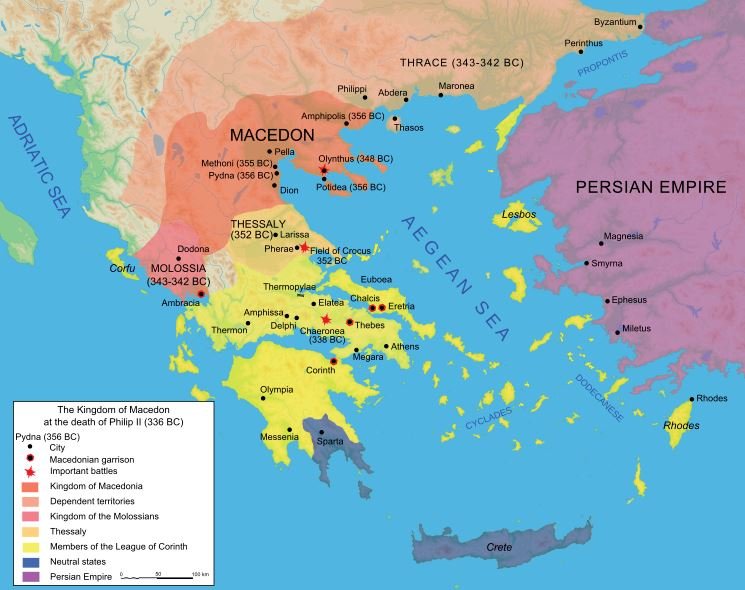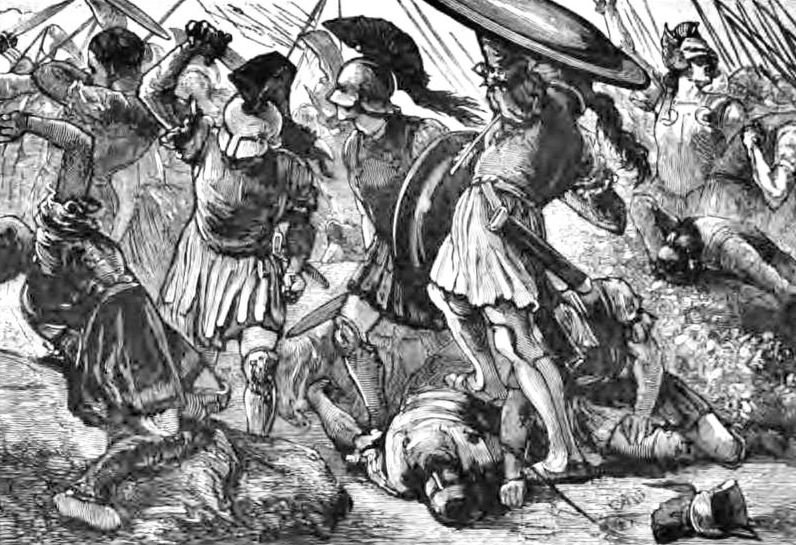How did Macedonia rise to dominance in ancient Greece?
Macedonia’s rise to dominance in ancient Greece was a transformative historical process that unfolded during the reign of Philip II of Macedon (reign: c. 359–336 BC). Initially a peripheral kingdom on the fringes of the Greek world, Macedonia emerged as a unified, militarily powerful state capable of influencing the political and cultural landscape of Greece. This dominance was achieved through military innovation, astute diplomacy, strategic alliances, and Philip’s visionary leadership. By the time of his assassination, Macedonia had become the undisputed hegemon of Greece.

A map showing and it environs circa 336 BC.
READ ALSO: Most Famous Kings of Macedon and their Accomplishments
Macedonia Before Philip II: A Peripheral Kingdom
Before Philip II’s reign, Macedonia was a fragmented kingdom vulnerable to external threats from neighboring tribes like the Illyrians, Thracians, and Greeks. The kingdom was culturally distinct from southern Greece, with its kings often considered semi-barbaric by their Greek counterparts. Internally, the Macedonian nobility operated with significant autonomy, often challenging the central authority of the monarchy. Philip inherited a state on the brink of collapse, but he transformed these weaknesses into strengths.

Bust of Philip II.
Military Reforms: Revolutionizing Warfare
One of Philip’s most significant contributions to Macedonia’s dominance was the reform of its military. He reorganized the Macedonian army into a professional, standing force. The introduction of the sarissa, a long pike, revolutionized the traditional phalanx formation, giving Macedonian infantry a decisive edge over Greek hoplites. Philip also integrated cavalry into the army, a force previously underutilized in Greek warfare, and developed specialized units such as archers and siege engineers. This multifaceted force proved instrumental in conquering and holding territory.
The Macedonian phalanx became a symbol of the kingdom’s military superiority, its effectiveness demonstrated in pivotal battles such as the Battle of Crocus Field (352 BC). Philip’s investment in siege technology allowed him to capture fortified cities, a task that traditional Greek armies often struggled to accomplish.

Diplomatic Maneuvering and Strategic Alliances
Philip’s success was not solely a product of military power. He was a master of diplomacy, using negotiations and alliances to neutralize threats and expand Macedonia’s influence. Through marriages to women from influential families and neighboring states, he secured alliances with Epirus, Thessaly, and Thrace. These unions helped stabilize Macedonia’s borders and provided Philip with political leverage in Greek affairs.
Philip also exploited divisions among the Greek city-states. After the Peloponnesian War and subsequent conflicts like the Corinthian War and the Theban ascendancy, Greece was politically fragmented and militarily weakened. By supporting one faction against another, Philip presented himself as a mediator and protector, gaining allies and avoiding direct confrontations until he was ready.
The Third Sacred War: A Path to Central Greece
Philip’s involvement in the Third Sacred War (356–346 BC) was a turning point in Macedonia’s rise to dominance. The war, sparked by religious disputes, allowed Philip to intervene in central Greece under the guise of defending the sacred site of Delphi. By defeating the Phocians and their allies at the Battle of Crocus Field, Philip established Macedonian hegemony in Thessaly and secured control over the powerful Thessalian cavalry. This victory also bolstered his reputation as a defender of Greek traditions, further legitimizing his role in Greek politics.
Subjugation of Thrace and Illyria
Philip expanded Macedonia’s territorial base by subjugating neighboring regions, including Thrace and Illyria. In Thrace, he defeated the ruler Kersebleptes and annexed key territories, establishing cities like Philippi and Philippopolis to consolidate his control. These cities served as administrative and economic hubs, enabling Philip to extract resources such as gold and silver to fund his campaigns.
Similarly, Philip defeated the Illyrian king Bardylis, securing Macedonia’s western borders and incorporating parts of Illyria into his kingdom. These victories not only eliminated external threats but also provided Philip with a larger pool of manpower and resources, essential for his plans in Greece.
Control of Strategic Locations
Philip’s strategy included gaining control over key geographic locations that allowed Macedonia to dominate trade routes and military corridors. His conquest of Amphipolis provided access to the rich timber and mineral resources of the region, which were crucial for maintaining his army and building a navy. By controlling Pydna and Potidaea, Philip secured Macedonia’s coastline, ensuring its dominance in the northern Aegean and limiting Athens’ influence in the region.
The Battle of Chaeronea: Securing Hegemony
The culmination of Philip’s efforts to dominate Greece came at the Battle of Chaeronea in 338 BC. Facing a coalition of Greek city-states led by Athens and Thebes, Philip demonstrated superior tactical and strategic capabilities. His army decisively defeated the Greek forces, and his son Alexander played a critical role in breaking the Theban lines. This victory marked the end of effective resistance to Macedonian dominance in Greece.
In the aftermath, Philip established the League of Corinth, a federation of Greek city-states united under Macedonian leadership. The League guaranteed peace in Greece and formalized Philip’s authority as its leader, paving the way for his planned invasion of Persia.

A depiction of the Battle of Chaeronea.
Economic and Administrative Strengthening
Philip’s consolidation of Macedonia’s dominance was underpinned by economic and administrative reforms. By founding cities and securing resource-rich regions, he created a robust economic base to support his military campaigns. The gold mines of Thrace and other revenues allowed Philip to maintain a professional army and fund diplomatic efforts.
Philip II’s achievements transformed Macedonia into a powerful state and laid the groundwork for the Hellenistic era under Alexander the Great.
Administratively, Philip centralized power, reducing the autonomy of the Macedonian nobility and integrating newly conquered territories into the kingdom. He established a system of royal companions and ensured loyalty by involving the elite in his court, effectively controlling potential rivals.
Exploiting Greek Disunity
Philip’s rise was facilitated by the persistent disunity of the Greek city-states. Decades of internecine warfare had left Athens, Sparta, and Thebes weakened and unable to form a united front against Macedonia. Philip skillfully played these divisions to his advantage, aligning with one power against another and positioning himself as a necessary arbiter of disputes.
By exploiting Greek disunity and positioning Macedonia as a legitimate part of the Greek world, Philip secured his kingdom’s hegemony.
Even at the height of resistance, such as during the Battle of Chaeronea, the Greek coalition lacked the cohesion and resources to challenge Macedonia effectively. Philip’s ability to exploit this fragmentation was crucial to his success.
The Role of Greek Culture and Identity
Although Philip’s rise to power was achieved through force and diplomacy, he also sought to align Macedonia with Greek cultural and political traditions. By presenting himself as a defender of Greek religion and customs, Philip reduced resistance to Macedonian rule. His inclusion of Macedonia in the Amphictyonic League after the Third Sacred War further integrated his kingdom into the Greek world.
The establishment of the League of Corinth reflected Philip’s vision of a unified Greece under Macedonian leadership. By positioning Macedonia as both a Greek power and a unifier, he secured a broader base of support for his dominance.
The Assassination of Philip and the Continuation of Macedonian Power
Philip’s assassination in 336 BC could have jeopardized Macedonia’s achievements, but his son, Alexander the Great, quickly consolidated power. Alexander inherited a unified, militarily powerful kingdom with established hegemony over Greece. This foundation enabled him to launch his conquests in Asia, furthering Macedonia’s influence and solidifying its place as a dominant power in the ancient world.
Questions and Answers
What were Philip II’s key strategies for unifying and expanding Macedonia?
Philip utilized strategic marriages, alliances, and effective diplomacy to secure internal stability and external alliances. His military reforms, including the Macedonian phalanx and siege technology, were pivotal for territorial expansion.
How did Philip reform the Macedonian army, and why was it significant?
Philip introduced the sarissa (long pike), reorganized the army into a phalanx formation, and incorporated cavalry and siege engineers. These innovations made his forces more effective and versatile, securing victories over traditional Greek armies.
What role did the Third Sacred War play in Philip’s rise to power?
The war allowed Philip to position Macedonia as the protector of Greek religious traditions, gain control of Thessaly, and emerge as a dominant force in central Greece, enhancing his legitimacy as a leader.

What was the significance of the League of Corinth?
The League unified Greek city-states under Macedonian leadership, ensuring internal peace and securing their cooperation for Philip’s planned campaign against Persia, marking a major step toward Greek unity.

What were Philip’s contributions to Macedonian infrastructure and administration?
Philip II of Macedon founded cities like Philippi and Philippopolis, established administrative systems in conquered regions, and developed the economy through resource exploitation, such as gold mining in Thrace.
How did Philip’s assassination impact Macedonia and Greece?
Philip’s death in 336 BC disrupted his plans for a Persian campaign but allowed his son Alexander the Great to inherit a unified kingdom, leading to the expansion of Macedonian influence across Asia.
Foundations and Characteristics of Alexander the Great’s Leadership



























